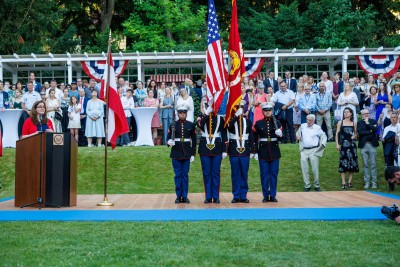U.S. Independence Day in Vienna: A Celebrations of Friendship and 250 Years of Diplomacy
During this year's celebrations of the United States' Independence Day in Vienna, Chargé d'Affaires Kami Witmer emphasized the outstanding partnership between the U.S. and Austria. This celebration, which took place in the run-up to the 250th anniversary of the United States next year, highlighted the deep historical ties and continued cooperation between the two nations.
 During this year's celebrations of United States Independence Day in Vienna, Chargé d'Affaires Kami Witmer emphasized the outstanding partnership between the US and Austria. / Picture: © US Embassy Vienna / U.S. Botschaft Wien
During this year's celebrations of United States Independence Day in Vienna, Chargé d'Affaires Kami Witmer emphasized the outstanding partnership between the US and Austria. / Picture: © US Embassy Vienna / U.S. Botschaft Wien
In her speech, Witmer emphasized that America's greatness stems not only from its internal achievements but also from its enduring friendships around the world. “America First does not mean America alone,” she aptly quoted Secretary Rubio, underscoring the importance of international alliances.
At the Embassy’s official 4th of July celebration this week, on the road to the 250th anniversary of the United States next year, Chargé d’affaires Kami Witmer reflected on the excellent partnership we enjoy.
— U.S. Embassy Vienna (@usembvienna) July 3, 2025
"America is a great nation. As Secretary Rubio has said,… pic.twitter.com/Xyuz4rSyuV
The celebrations coincided with a significant year for Austria, which is commemorating 80 years since its liberation from National Socialism and 70 years since the signing of the Austrian State Treaty. Witmer recalled President Eisenhower's message to President Theodor Körner in 1955: “The American people are proud and happy about the prospect that Austria can play its full role in world affairs with dignity, self-respect, and freedom.” This message, according to Witmer, is still valid today. The U.S. is proud, then as now, to stand alongside Austria as a partner.
Historical alliances shaped the birth of the U.S.
Chargé d'affaires Witmer's emphasis on international partnerships resonates strongly with the founding history of the United States itself. The U.S. embassies promote the international side of the American Revolution through their in-house platform ShareAmerica. Even during the American Revolution, the Second Continental Congress, which convened in Philadelphia on May 10, 1775, recognized the need for foreign allies. At that point, clashes with British troops had already begun in Lexington and Concord.
In an early diplomatic initiative, Congress established the Committee of Secret Correspondence in November 1775 – America's first diplomatic mission. This committee, headed by Benjamin Franklin, who later became the first accredited U.S. diplomat, established contacts with sympathisers in Great Britain and friends in France and Spain. The aim was to secure financial resources and weapons for the war.
France in particular played a decisive role. Silas Deane, an American envoy, was sent to France to request military support. In February 1778, France and the U.S. signed a treaty of mutual assistance, which sealed France's formal support in the war against Great Britain. Spain also later declared war on Great Britain and provided important financial assistance.
Historian Tom Hand, author of An American Triumph, points out that Spain's entry into the war stretched British war capacity and turned the conflict from a regional war into a costly global one. Toward the end of the war, France sent troops and naval vessels, whose decisive help led to the British surrender at the Battle of Yorktown. In 1783, a delegation led by Franklin negotiated the Treaty of Paris, which ended the Revolutionary War. “Without France, we could not have kept our soldiers in the field,” Hand said.
The history of American independence is thus closely linked to the formation of strategic international alliances—a principle that the United States still considers a cornerstone of its foreign policy today.



